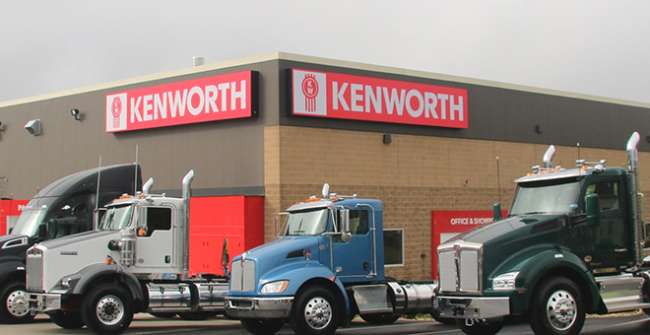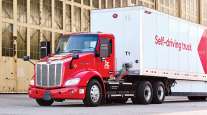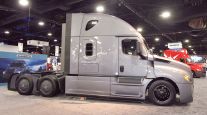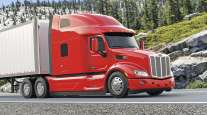Senior Reporter
Class 8 Sales Jump 43% in December to Cap Strong 2017

U.S. Class 8 retail sales in December cleared 22,000 for the highest volume since mid-2015, WardsAuto.com reported, as analysts forecast higher volumes for the year ahead.
Sales rose 43% to 22,355 compared with 15,629 a year earlier, according to Ward’s.
December’s volume was the highest of the year and the most since July 2015, when the total reached 23,383.
For the full year, sales hit 192,252, down 0.2% from 2016’s total of 192,664.
December’s year-over-year improvement was aided by the fact that sales in 2017 started slow, then built in the second half, while 2016 started strong but ended by tailing off — making for an easy comparable.
“We have been waiting on [increased demand] for a long time,” said ACT Research Co. Vice President Steve Tam.
ACT’s full-year 2017 U.S. retail sales forecast called for 195,800 units. The year didn’t progress quite as swiftly as he hoped, but the catch-up in December helps to make up some of that, Tam said. “Quite honestly, a few thousand units here or there is no big deal. It will get made up pretty easily, I think, as we start to roll through 2018,” he said.
But there has never been this much pressure on the market, said Don Ake, vice president, commercial vehicles, FTR.
“The driver shortage is limiting [sales], but demand is so strong [anyway], this is what you get,” he said.
Both replacement and expansion are pushing new sales as freight volumes grow and rates climb, Ake added.
In December, all truck makers but one notched sales gains.
Volvo Trucks North America, a unit of Volvo Group, saw sales decline 16.1% year-over-year, but the truck maker cited a transition to its latest models and the end of production of earlier ones as the key factors.
With freight demand and rates climbing, the midyear launch of VTNA’s new VNR series for regional haul and VNL series for longhaul was auspicious, said Magnus Koeck, Volvo Trucks North America vice president of marketing and brand management.
“Anticipation of the new VNR and VNL, which entered production in late Q4 2017, tempered demand for the legacy VNM and VNL series, of which we’ve ceased sales,” Koeck said.
VTNA’s sales in December fell to 1,976, and an 8.8% share, compared with 2,354 and a 15.1% share a year earlier.
Volvo Group’s North American Class 8 sales forecast is for 260,000 units and the company is seeing upward market pressure, Koeck added.
Sales at market leader Freightliner ballooned 94.4% in December, reaching 8,504 trucks and a 38% share, compared with 4,375 trucks and a 28% share a year earlier. Freightliner is a brand of Daimler Trucks North America.
According to a survey, Freightliner dealers expect the good times to continue.
“Notably, 96% of contacts indicated that new Class 8 sales at their dealership will be up in 2018. Contacts expect that vocational activity will continue to be strong heading into 2018,” Neil Frohnapple, director of equity research for The Buckingham Research Group, wrote in a note to investors that discussed the results of his recent poll of Freightliner dealers.
Also, Frohnapple’s survey found Class 8 pricing remains competitive, but the vast majority of dealers he spoke with said there is no abnormal discounting by truck makers.
Kenworth Truck Co. sold 4,104 trucks, good for an 18.4% share. That compared with 3,079 and a 19.7% share in December 2016.
Peterbilt Motors Co. sold 3,071 trucks in December, good for a 13.7% share. In December 2016, it sold 2,120, earning a 13.6% share.
Kenworth and Peterbilt are brands of Paccar Inc.
International Truck, a unit of Navistar International Corp., had 2,064 sales, a 62.6% increase, earning it a 9.2% share. That compared with 1,269 and an 8.1% share a year earlier.
Mack Trucks, also a unit of Volvo Group, posted sales of 1,939 for an 8.7% share. That compared with 1,903 and a 12.2% share in the December 2016 period.
“Mack ended 2017 on a positive note with solid December retail sales figures, as customers continue to turn to us to improve their productivity and profitability,” said Mack Vice President of Marketing John Walsh.
Other truck makers did not immediately respond to requests for comment.
Western Star, DTNA’s niche brand, sold 694 trucks for a 3.1% share. In December 2016, it sold 521 for a 3.3% share.
Truck makers ended the year with their 12-month market shares largely the same as they were in 2016, according to Ward’s — with two exceptions. Peterbilt increased its full-year 2017 share by 2.1 percentage points to 15.9%, while VTNA saw its 12-month share slip 1.8 percentage points to 8.9%.
Freightliner’s market share for the year dipped to 37.5% from 37.6%, while Kenworth’s share remained at 15.3%. Mack’s share slipped to 8.3% from 8.9%, while International’s share rose to 11.4% from 11.1%.
Western Star’s share inched up to 2.7% from 2.6%.




